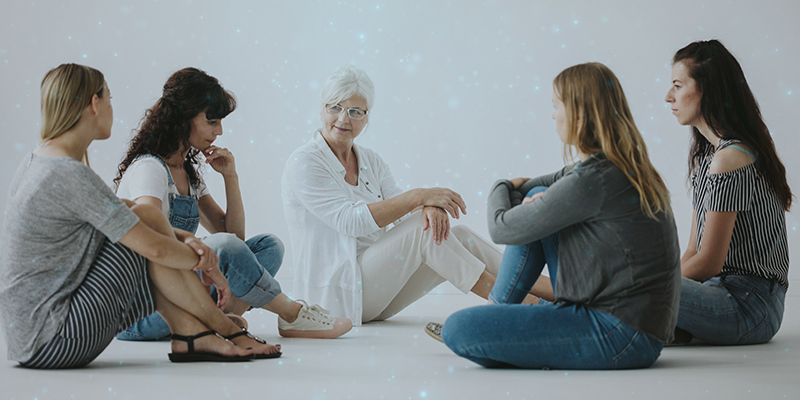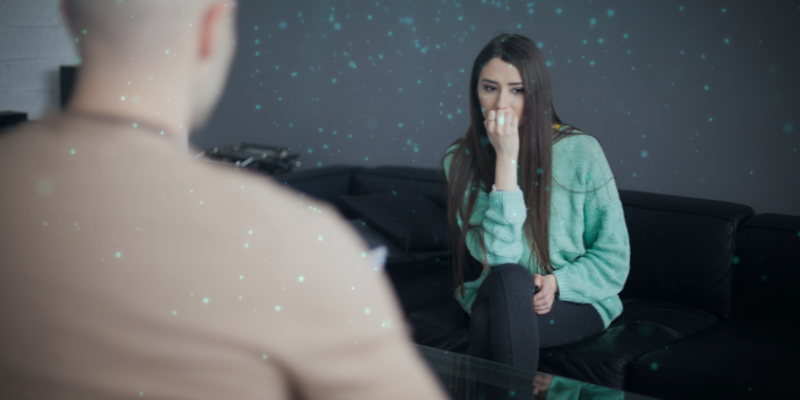
When faced with novel, unfamiliar, or challenging situations, many people might break a little sweat or get a few butterflies in their stomach, but others become very nervous and fearful. Could this mean they have a real anxiety disorder?
Maybe—but maybe not.
Our brains are wired to warn us about potential threats, even if they aren’t real. Certain things that are not life-threatening but put us outside our comfort zone in some way can actually cause the brain to set off an “alarm” which manifests as mental and physical anxiety. When this happens, it might suddenly be difficult to stay focused or breathe normally and your mouth might start feeling like the Sahara desert. As distressing as symptoms like these can be if they pass pretty quickly once the circumstance that caused them is over, it’s likely due to something called situational anxiety.
WHAT IS SITUATIONAL ANXIETY?
An automatic anxious response to certain events, settings, or experiences—situational anxiety differs from one person to the next. For some people, it’s a rare occurrence, while for others it may happen each time they are in a specific type of situation. And there are a variety of things that can provoke unpleasant nervousness in those who are vulnerable to this condition.
Situational anxiety is an automatic response that can occur with specific events, settings or experiences that provoke an unpleasant nervous response in those who are vulnerable to it. Click To TweetHave any of these ever made you feel worried or very apprehensive?
- Expressing your opinion during a staff meeting
- Being on a first date
- Public speaking or doing a group presentation
- Going to a party alone and talking to unfamiliar people
- The first day at a new job
- Heading off to college
- Preparing for or being interviewed for a new position
- Traveling to an unfamiliar place
Situations like these—or even anticipating them—can become a catalyst for the emergence of seemingly uncontrollable anxiety symptoms, such as:
- Excessive worrying
- Increased irritability
- Having your mind go blank
- Feeling apprehensive and/or embarrassed
- Restlessness or being jittery
- Gastrointestinal issues
- Rapid breathing and elevated heart rate
- Trembling and/or sweaty hands
- Headaches and muscle tension
- Sweating or feeling flushed or chilled
- Difficulty sleeping before the event
ANXIETY DISORDERS VERSUS SITUATIONAL ANXIOUSNESS
Fortunately, the uncomfortable symptoms generally don’t last too long, and because of the transient nature of situational anxiety, it does not meet the criteria for a true mental health disorder. Not to say it doesn’t cause distress, but it differs considerably from the anxiety conditions that are included in the Diagnostic and Statistical Manual for Mental Disorders.
For example, in generalized anxiety disorder (GAD), a person will suffer from similar symptoms, but rather than being episodic and related to specific situations, they are much more chronic. People with GAD tend to worry incessantly about normal everyday activities, responsibilities, and circumstances to the extent that it significantly impacts their psychological and social functioning.
Similarly, individuals who have panic disorder struggle with recurrent and often unexpected attacks (meaning there is no known precipitating event) that come on abruptly causing physical symptoms such as a racing heart, shaking, shortness of breath, sweating, and dizziness that can make them feel like they are losing control—or even dying.
5 TIPS FOR MANAGING SITUATIONAL ANXIETY
Not only is it stressful to endure the anxiety that arises with certain situations, but it can also be embarrassing and affect your confidence and self-esteem. Fortunately, there are some actionable ways, such as the 5 tips below, that can help you learn to manage—or even overcome—the symptoms that cause you such anguish.
1. Get help.
Schedule an appointment to talk with a psychotherapist about this. By doing so, you can identify the underlying (and possibly subconscious) fears that precipitate your symptoms of anxiety related to specific situations. A therapist can help you work through them and heal from whatever memories, beliefs, or experiences are holding you back.
2. Practice diaphragmatic breathing.
This is very simple and has been shown to reduce anxiety and help people feel more grounded, especially during stressful moments. Here’s how to do it:
Breathing with your diaphragm (belly), rather than your upper chest,
- Inhale for 3 – 4 seconds
- Hold for 1 second
- Exhale for 6 – 8 seconds
- Hold for 1 second
- Repeat 10 times
It takes just a few minutes, and you can do this anywhere—even in a meeting.
3. Stay physically active.
Be sure to get adequate amounts of exercise to help discharge that extra nervous energy. Not only does physical activity divert your attention away from what is causing the stress, but it also increases the availability of natural anti-anxiety brain chemicals that can help you feel calmer.
4. Think about your thoughts.
With any kind of anxiety, it is common to exaggerate fearful or negative thoughts. So, when you become anxious thinking about something you must face, pay attention to the thoughts running through your mind, and write them down. Reality test each one by answering these 4 questions:
- Is it true?
- Is it absolutely true—with 100% certainty?
- When you have this thought, how does it make you feel?
- How might you feel differently if you didn’t have this thought?
Next, take the fearful or negative thought you had written down and turn it around to its opposite. Could this new thought actually be more accurate than the original one?
5. Watch what you eat and drink.
When you’re nervous, it can be easy to reach for comforting, but unhealthy foods like cookies or doughnuts. However, if you do they will destabilize your blood sugar and eventually cause you to feel more irritable, nervous, and foggy-headed. It’s also important to stay away from caffeine, which when consumed, blocks the adenosine receptors in your brain that would otherwise allow you to feel more relaxed.
There’s no question that getting really nervous during important events is distressing and awkward and can affect the perceptions you have about yourself and your abilities. However, by using strategies like the ones listed above, you can get control of the situational anxiety that diminishes your sense of well-being.
If, however, you find yourself becoming increasingly anxious it’s important to speak to a mental health professional who can assess your symptoms and help you with a treatment plan that can significantly reduce the anxiety that is interfering with your life.
Anxiety, panic disorders, and other mental health issues can’t wait. At Amen Clinics, we’re here for you. We offer in-clinic brain scanning and appointments, as well as mental telehealth, clinical evaluations, and therapy for adults, teens, children, and couples. Find out more by speaking to a specialist today at 888-288-9834 or visit our contact page here.





excellent advice!
Comment by Doug Morris — July 22, 2023 @ 4:04 PM